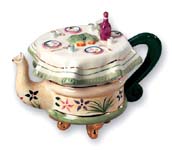| Kosher Teas - Made in Israel and around the world |
|
Tea is the agricultural
product of the leaves, leaf buds, and internodes of
the Camellia sinensis plant, prepared and cured by
various methods. "Tea" also refers to the aromatic
beverage prepared from the cured leaves by combination
with hot or boiling water, and is the common name for
the Camellia sinensis plant itself. After water, tea is the most widely consumed beverage in the world. It has a cooling, slightly bitter, astringent flavour which many enjoy. There are at least six varieties of tea: white, yellow, green, oolong, black and pu-erh of which the most commonly found on the market are white, green, oolong and black. All teas are made from the same species of plant, though different varieties may be used, and the leaves are processed differently, and, in the case of fine white tea, grown differently. Pu-erh tea, a post-fermented tea, is also often used medicinally. The term "herbal tea" usually refers to an infusion or tisane of leaves, flowers, fruit, herbs or other plant material that contains no Camellia sinensis. The term "red tea" refers to an infusion made from either black tea (mainly in Chinese, Korean, Japanese and other East Asian languages) or the South African rooibos plant (containing no Camellia sinensis).
Green tea is tea made
solely with the leaves of Camellia sinensis that have
undergone minimal oxidation during processing. Green
tea originates from China and has become associated
with many cultures in Asia from Japan to the Middle
East. Recently, it has become more widespread in the
West, where black tea is traditionally consumed. Many
varieties of green tea have been created in countries
where it is grown. These varieties can differ
substantially due to variable growing conditions,
processing, and harvesting time. |
||||||||||||||||||||||||
|
Aharon's Jewish Books and Judaica 8 Kosher Tea ~ Made in Israel
|
||||||||||||||||||||||||
|
|
||||||||||||||||||||||||
 Serving
kosher coffee, tea and foods from Israel Serving
kosher coffee, tea and foods from Israel |
||||||||||||||||||||||||
|
Judaic - Jewish Collectables |
||||||||||||||||||||||||
|
||||||||||||||||||||||||
Aharon's
Jewish Books and Judaica Map to Aharon's Jewish Books and Judaica Store Hours Monday through
Thursday 9 AM to 6 PM |





